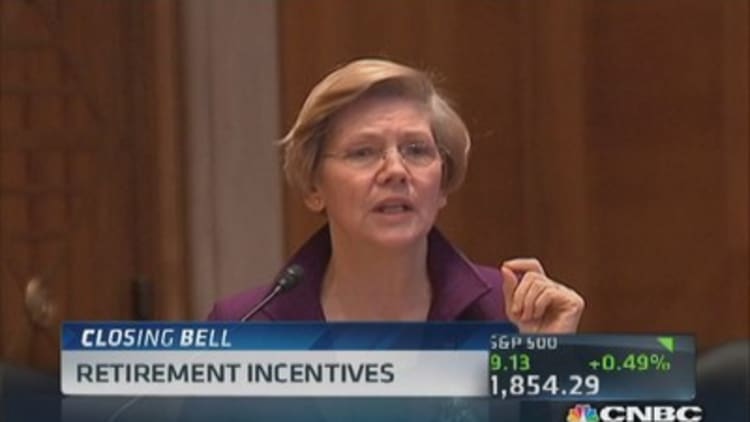As a financial advisor who has worked with retirees for more than 20 years, I've come to learn one thing: Retirement is not for everyone. In fact, it's not for a whole lot of us.
During the 1990s, with the stock market charging and everyday folks making millions from dot-coms, the conventional wisdom of the day was to retire as young as possible. There was a certain pride that went along with being young and retired, and people were cashing out as early as possible.
Not anymore.
Today many retirement-aged folks are continuing to work, for a variety of reasons. Many simply can't afford to retire, because they don't have enough saved.Their corporate pension plans—in the unlikely event they still have one—don't pay nearly enough. Their savings haven't grown at the rate they had planned, and interest rates are so low they can't generate enough income to replace their salaries. Plus, many would-be retirees still have a ton of debt on their homes.
(Read more: Forget the flashy car and save up instead)
Yet others are continuing to work because they've come to believe that retirement isn't all it's cracked up to be.
They've seen friends retire young and "enjoy life" by traveling in their motor homes, wintering in the Sunbelt, golfing every day and so on. But they continue to work because they think they'll find more satisfaction by staying in the game and contributing to society rather than living a life of leisure.
Granted, many retirees do contribute to society through volunteerism and philanthropy, but studies have shown that if people aren't engaged in volunteerism by midlife, they won't be engaged in it during retirement.
A friend of mine recently joked that "retirement was such a '90s thing."
The concept of retirement is a relatively new phenomenon. In the not-so-distant past, people worked at physically demanding jobs until the day they died. The concept of having enough money saved so you didn't have to labor applied only to the gentry. But the 20th century changed much of that—at least, in the Western world.
(Read more: Seniors warned, beware of selling pension)
With the creation of Social Security, pension plans, unions and a rapidly increasing lifespan, retirement became a dream for many in the growing middle class. You worked for a company for 30 years, got a gold watch and received a monthly check until your dying day.
Now that people are living longer and retirement is out of reach for many, retirement should not be a goal for most. Rather than planning and saving for retirement, how about planning and saving for financial independence instead?

Financial independence is a much worthier goal than traditional retirement. With financial independence, work becomes a choice and not a necessity.
(Read more: The pros and cons of long-term care insurance)
Financial independence may mean that a person could retire while they are still relatively young. But it also may enable a person to make a career transition later in life. Or to simply reduce daily stress in the knowledge that their work is their choice, not something society has forced on them.
So rather than save for retirement, save to the point where you have the freedom to retire or not retire. View your retirement savings not as your ticket to a life of luxury but, rather, as a vehicle that allows you to do those activities that you value most. This may likely be work and not retirement.
I've often thought about what our lives today would be like if some of the great innovators of all time had retired once they'd accumulated enough dollars. What would life be like if Thomas Edison had retired as soon as he'd saved enough? Or if Bill Gates had retired at age 30? Or suppose Mark Zuckerberg gave up work at 17? (Okay, he may have been a few years older by the time he created Facebook.)
(Read more: Make sure your nest egg doesn't crack)
Whatever your view of retirement is, one thing is for certain: It's important to save for the future, regardless of whether you ever want to retire or not.
Whatever your view of retirement is, one thing is for certain: It's important to save for the future, regardless of whether you ever want to retire or not. There may come a day when you may not be able to work, due either to health reasons or the job market.
But even if you abhor the concept of retirement and plan on working until the day you die, you'd better have something set aside in the event your own health, or the health of a loved one, prevents you from working every day.
(Read more: It pays to take the long view on finances)
In the spirit of full disclosure, I'm 47 years old and probably at the height of my career. Perhaps in 10 to 20 years, I'll be so burnt out that the concept of sitting in a recliner and taking it easy sounds appealing. But after speaking with hundreds of retirees, I seriously doubt it.
—By Scott Hanson, Special to CNBC.com. Scott Hanson, a certified financial planner, is a senior partner at Hanson McClain Advisors in Sacramento, Calif.





